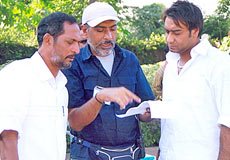 Prakash Jha’s next venture, the big budget Rajniti, will be a distillation of all the political films that he has made to date.
Prakash Jha’s next venture, the big budget Rajniti, will be a distillation of all the political films that he has made to date.
“Rajniti will be a summation of my understanding of the contemporary political situation at the national level,” Jha says. “My political films have all so far been set in the state Bihar. This one will be shot primarily in Delhi.”
Rajniti, the writer-director reveals, will essentially track the goings-on during the heat of an electoral battle. “A government is toppled, an election is declared and, in the end, the results are announced. What happens during the election is what Rajniti is all about,” he says.
Jha has been working on the Rajniti screenplay for nearly four years. “I am now on to the third draft of the script, and by the time the film rolls at the end of the year, there might be a few more drafts,” he says.
Ajay Devgan and Nana Patekar, the stars of Jha’s last release, Apaharan, will feature in Rajniti as well. “The rest of the cast hasn’t been finalised yet,” says Jha. “Rajniti will have five or six major characters, each one of them drawn from the Mahabharat, and I will be signing several frontline actors to play these parts.”
Although essentially a fictional take on the current political scene in the country, Rajniti, like all of Jha’s other films, will be grounded in the real world. He says: “The film will seek to throw light on why our national-level politics is the way it is. It will show how the forces that dominate elections today were created.”
Will he seek to take a political stand in the film? “A filmmaker cannot afford to take sides,” he replies. “I can only be an objective observer, a chronicler. The film will present my interpretation of the reality.”
While Rajniti will be by far the biggest film of Jha’s eventful filmmaking career, it will be driven by the ground rules that govern the director’s craft in general. “Mrityudand,” says Jha, “wasn’t just the story of three women. Gangaajal used the Bhagalpur blindings only as a flashpoint. Apaharan isn’t only about the kidnapping racket. All my films try and present the bigger picture. Rajniti will be no different.”
It is important for a filmmaker, he says, to keep the audience in mind. “Apaharan is an unrelentingly dark film. There is no relief. It wouldn’t have worked if it hadn’t been paced right.”
In terms of style, form and pacing, Jha’s films are obviously designed to entertain. “That is the only way I can survive. I can no longer make a Damul. While I use a popular, simple form to tell a story, I ensure that I do not deviate from my principal intent to reflect the reality. I use cinema – it’s the only language I know – to communicate with my audience. I make films because I have something to say.”
That explains why Jha is the only filmmaker in Bollywood who consistently makes films that address real political issues. Films like Gangaajal and Apaharan were hard-hitting enough, but with Rajniti, Jha is poised to go further than ever before.